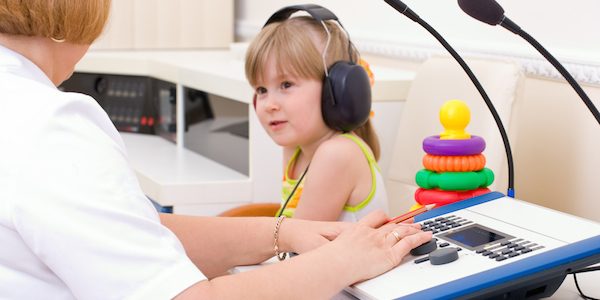
Preschool can sometimes be a confronting time for parents as they compare their child to others their age, sometimes for the first time.
For some parents, it may be the first time they notice their child is having difficulty in one or more areas.
During preschool many children will develop new talking and listening skills.
Here I have answered some of the most common questions asked by parents.

I always encourage parents to get their child’s hearing tested particularly children who have frequent ear infections. Middle ear infections and fluid filled ears are a common cause of hearing loss in children.
Hearing has a huge role to play in children’s early communication so get them tested. We typically recommend children get their hearing checked arounf the age of 18months if their language is not developing as expected and a hearing check before beginning kindergarten is also recommended. If you want to learn more about what a children’s hearing test involves you can find out more at Australian Hearing.
Consider a hearing test if your child is
If your child is showing any of the above signs, talk to your GP and arrange a hearing assesment.
He says ‘cat’ as ‘tat’. Is this normal?
This is something lots of kids do.
They may also change the ‘g’ sound to ‘d’ (e.g. “go” is “do”). We call this fronting.
Children will usually grow out of it by 3 ½. If they are still having trouble with this speech sound at 4 then it is worth seeing a Speech Pathologist for further assessment and treatment.
He says ‘red’ as ‘wed’ and ‘lie’ as ‘why’. Is this normal?
The “l” sound develops around the age of 4 so you should see this error pattern starting to change around that age.
The ‘r’ sound is one of the last to develop. This kind of error is considered typical up until the age of 6 years.
I often tell parents to start monitoring the R sound when their child turns 5.
For some children they may develop anywhere up until the age of 7.
The same goes for the ‘th’ sound as well, which can develop as late as 8 years of age.
Should I be concerned?


I call it the ‘yellow phenomenon’ – it is perhaps the hardest word for kids to get right!
I have seen numerous kids who cannot say the ‘y’ sound in ‘yellow’ but can easily say words like ‘yoyo’ and ‘yoghurt’.
I recently read a study from the UK that found 70% of preschool age kids mispronounced the word ‘yellow’, followed by ‘spaghetti’ that was mispronounced by 17% of surveyed kids.
Why?
Some words are just harder to pronounce than others!
If your child is mispronouncing a few words like ‘yellow’, ‘spaghetti’ or ‘ambulance’ then don’t panic. This doesn’t necessarily mean they need speech therapy. Try breaking up the syllables and clapping out the sounds together e.g. spa-ghe-tti
However, if they are still having trouble by the time they reach school then it may be worth following it up with a Speech Pathologist.
There are two types of lisps: interdental lisps and lateral lisps. An interdental lisp is when a child’s tongue protrudes between their teeth and so their ‘s’ and ‘z’ sounds more like a ‘th’. These are more common.
Lateral lisps are less common and sound like a wet or slushy sound ‘s’ or ‘z’ with air escaping out the sides of their mouth.
There are different opinions out there about whether children ‘grow’ out of lisps or not, however clinically we find lisps usually require intervention.
A Speech Pathologist will be able to listen to your child’s speech and determine if therapy is required.

Some kids just struggle getting their pronouns right. Children learn different pronouns at different ages.
Pronouns like “I”, “it”, “me”, “my” and “you” are normally first on the scene between around 1 to 2 ½ years of age.
By the time a child is 3 years old they should be using pronouns like “he”, “she”, “hers”, “his,” “they,” “theirs”.
By four they should be using all pronouns except reflexive pronouns like “herself”, “himself” and “themselves”.
When working with young children and teaching kids about pronouns we are always considerate of pronoun choice and teaching the pronoun “they/their” for use when someone’s gender is unknown.
Four year olds should be using sentences with four or more words. Read more in our Milestone Handouts
We tend to find that sentence length is usually a good predictor of language skills.
Children who use fewer words usually have more basic language skills and further assessment is a good idea.
No one knows your child as well as you, the parent. Trust your intuition and if you have any concerns about your child’s communication then contact a Speech Pathologist today. The research shows us that we achieve the best outcomes when treatment is sought in the preschool years.
An initial consultation with a Speech Pathologist may put your mind at ease and help you to figure out whether your child needs further assessment or therapy.
To book an initial consultation with our team click here
Read How to accelerate your child’s language development
Want to know what language skills to expect at your child’s age click here